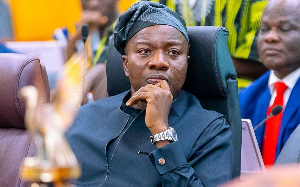COMMITTEE FOR JOINT ACTION (CJA) PRESS CONFERENCE STATEMENT PEOPLE’S 6TH MARCH GOLDEN JUBILEE PROCESSION
Ladies and Gentlemen of the media:1. We thank you warmly for meeting once again with us so soon after our last meeting. We had not hoped to engage with you again until after 6 March when we would report to you on the success of our “People’s Jubilee Procession”. Unfortunately, as you know, the Ghana Police Service has opposed our jubilee procession and requested a postponement. We, in turn, have rejected the Police objections and indicated that we will go ahead as announced. These events have inspired considerable public discussion with the inevitable misconstruction and misrepresentation. We invited you here today to request your assistance in making our views clear to the public.
The arguments against a Peoples’ procession 2. Ladies and Gentlemen: let us first clarify a few issues. We welcome a debate. Our critics have made several arguments. They claim that our agenda is simply to embarrass Government. They deny that the official programme is narrow and exclusive. They say that in any case, this is the way we have always done things in Ghana. They insist that because of the international focus on Ghana, the golden jubilee is not the time to expose our national divisions. We think these arguments go right to the heart of our concerns and demonstrate why a Peoples’ Procession is absolutely the right thing to do.
Embarrassing Government
3. Our objective is to present Ghanaians and the world with our views about the true political significance of Ghana’s independence. We wish to pay tribute to the organised masses of ordinary Ghanaians and the progressive political leadership that made independence possible. We wish to honour Kwame Nkrumah as the pre-eminent leader of our independence struggles. We will congregate at the Kwame Nkrumah Circle and the Kwame Nkrumah Mausoleum - the only public monuments to his memory (tragically and shamefully neglected by the powers that be). We are all for a pluralistic celebration. We do not seek to deny any other strand of political opinion in Ghana access to the celebrations – not even those who fought so hard against republican independence in Ghana. We are certainly not looking for opportunities to embarrass Government. On the other hand, if the truth is unpalatable to some sections of society, or if honouring our heroes embarrasses some people or diminishes their self-importance, then we humbly suggest that it is these people, and not us, who should reconsider their positions. There is an interesting historical parallel. In the forties and fifties too there were those who were willing to silence the masses and even surrender compromise our right to sovereignty rather than embarrass the colonial ruler. They are not the ones we honour during our golden jubilee. We celebrate those who put the people’s needs first. These are the lessons of Independence.Expanding Participation
4. We say the official programme is narrow and exclusive. And we are not alone. The leadership of the Nkrumaist parties, the CPP and PNC have said so. The largest minority party the NDC has said so. Other social groupings have said so. Why is it that by far the major events that appear to have any political, intellectual or cultural significance are strictly by invitation? It is significant that even a Member of Parliament and Government Minister Kwesi Nduom has complained in the last week about political exclusion and even suggesting that the management of the official process is not sufficiently accountable to our Parliament! Last week’s belated noisy effort to bring President Rawlings on board is also an official acknowledgement of this exclusion. Why is it that the highlighted entertainment and social events carry price tags that make them inaccessible to all but the rich? Nowhere is there a street party, or a free concert; events through which ordinary people can express themselves creatively and freely. Why did we not see a fitting official celebration of the anniversary of “Positive Action”? Just a few months ago the public responded as one to our world cup success in an unprecedented festival of national colours. Yet, in the last week the same public has shown almost complete indifference to innovative and potentially unifying concepts like “National Chocolate Day” or “Rally ‘round the Flag”! We ask “why?” The reason is simple. The masses disapprove! They have either been completely shut out or have been relegated to the role of spectators at self-congratulatory official events such as parades. This is wrong and we have a right to correct this. These are the lessons of independence.There is no alternative ..
5. The argument that this is the way things have always been done is a defeatist and even colonial argument. If we are doomed endlessly to repeat our mistakes over and over again, then our independence is meaningless. The independence revolution was nothing if it was not a declaration that we would no longer tolerate business as usual. Will we celebrate its golden jubilee by rejecting our own creativity and self-empowerment? Will we also continue to tolerate the collapse of our water, electricity, health and education systems – just because they are not new? Will we say that because political and public service corruption and indifference did not start in 2005 then we should be content to live with them? Again, those who make this argument are thinking not of the public well-being but the comfort of our rulers. They are desperately seeking to let the current Government off the hook. Let us lift our eyes above this petty partisan approach and for once try and do the right thing for the country. These are the lessons of Independence.National Unity!
6. What of the appeals for a show of national unity during the 50th anniversary? We say: “who are we fooling?” Our country is more divided today than at any point in its history (except the tragic "ma te me ho" period!). We are indeed interested in unity. However we want the substance and not just the appearance. Genuine unity and stability will come from open, tolerant engagement about our differences. We cannot achieve unity by silencing dissent.The effort to tightly control every aspect of the jubilee and create a false media image of national consensus and support for the ruling elite’s agenda has already failed. The embarrassing and insincere efforts to secure President Rawlings’ participation in the official 6 March celebrations are pointless. President Rawlings can attend all the parades and banquets, sit at President Kufuor’s right hand and smile nicely for the cameras. It would not mean national reconciliation or unity. In a country with such extremes of wealth and poverty there cannot be a common agenda – only class agendas. In a country where large sections of opinion continue to be suppressed by the police, there cannot be nation-wide unity. And no one – not the invited VVIPs or the Ghanaian public is fooled. It is only our leaders who will be lulled into a sense of false security by their own security and media management machines. This self-deception too has colonial parallels. Our colonial masters once deceived themselves that we loved them because the colonial elite and helpless school children lined up on Empire Day to chant “Rule Britannia”. These are the lessons of independence!
The police Response
7. Ladies and Gentlemen: We turn now to our discussion with the Police. As citizens we must cultivate correct constitutional relationships with the Police. To protect and expand our constitutional freedoms we must always ask: are the police operating within their legitimate authority? In this case we think that they are not. The Public Order Act is explicit about the grounds on which the Police may suggest modifications to citizens’ plans for special public events. Section 3 subsection (4) reads:Where a police officer notified of a special event under subsection (1) has reasonable grounds to believe that the special event if held may lead to violence or endanger public defence, public order, public safety, public health or the running of essential services or violate the rights and freedoms of other persons, he may request the organisers to postpone the special event to any other date or to the relocate the special event.
8. DCOP’s Akrofi’ letter dated 14 February 2007 gives only two reasons for requesting a two-week postponement of the procession.
a. Paragraph 2 states: “In view of police preparation towards Ghana’s 50th anniversary, majority of our personnel shall be detailed for the Anniversary parade and other security coverage duties”.
b. Paragraph 3 states: “...considering the number of Heads of States, VVIPs and visitors arriving in Ghana, prior, during and after the Anniversary, the Police shall be over burdened”
9. The Police do not claim to have reasonable grounds to believe that our procession will “lead to violence or endanger public defence, public order, public safety, public health or the running of essential services”. Nor do the police suggest that the procession will “violate the rights and freedoms of other persons”. Accordingly, the Police have no right under the Public Order law to interfere with our procession. The letter of 14 February does not meet the requirements of the Public Order Act and has no effect. Mr. Akrofi’s radio appearances do not constitute formal police communications. More importantly the Police have not established the formal or substantive basis for an application to the Court under the Public Order Act for an order prohibiting the Peoples’ Procession.
10. The arguments that the Police make in their letter are arguments about inconvenience. We indeed sympathise with their difficulties. However, as we have argued many times in the past the Police’ constitutional duty to support the exercise of citizens’ constitutional rights overrides considerations of administrative convenience. In this case we gave the Police a full month’s notice precisely to enable them to address logistical issues effectively. That is enough. In any case, we do not believe there is the slightest risk either to ourselves or the public and we are quite happy to regulate our own procession without Police assistance. We are satisfied that there are and can be no legal obstacles to our 6 March procession and we will proceed as announced. Once again we invite believers in independence – nationalists and Pan-Africanists to join us.
Thank you very much for listening to us. As usual, we would be happy to take any questions you might have.
Kyeretwie Opoku On behalf of the CJA 19th February 2007












